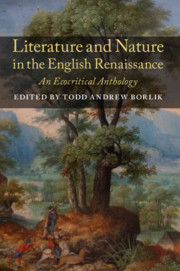Book contents
- Frontmatter
- Contents
- List of Illustrations
- Acknowledgements
- Editorial Principles: Towards the Ecocritical Editing of Renaissance Texts
- Introduction
- PART I Cosmologies
- PART II The Tangled Chain
- PART III Time and Place
- PART IV Interactions
- PART V Environmental Problems in Early Modern England
- PART VI Disaster and Resilience in the Little Ice Age
- Appendix A Industrialization and Environmental Legislation in the Early Anthropocene: A Timeline
- Appendix B Further Reading: A Bibliography of Environmental Scholarship on the English Renaissance
Appendix A - Industrialization and Environmental Legislation in the Early Anthropocene: A Timeline
Published online by Cambridge University Press: 05 June 2019
- Frontmatter
- Contents
- List of Illustrations
- Acknowledgements
- Editorial Principles: Towards the Ecocritical Editing of Renaissance Texts
- Introduction
- PART I Cosmologies
- PART II The Tangled Chain
- PART III Time and Place
- PART IV Interactions
- PART V Environmental Problems in Early Modern England
- PART VI Disaster and Resilience in the Little Ice Age
- Appendix A Industrialization and Environmental Legislation in the Early Anthropocene: A Timeline
- Appendix B Further Reading: A Bibliography of Environmental Scholarship on the English Renaissance
Summary
1490 First blast furnace at Queenstock, Buxted.
1496 Blast furnace at Ashdown Forest in the Weald.
1503 c. 11 Act against Deer-hays and Buckstalls. Outlaws the use of ditches and nets in forests, chases, and parks and blames them for the “destruction of red deer and fallow.”
1511 c. 11 Act for the Appointing of Physicians and Surgeons.
Prohibits unlicensed physicians from dispensing medicines and accuses “ignorant persons” who do so, such as “smiths, weavers, and women,” of “sorceries and witchcraft.”
1512 c. 8 Strode's Act.
Exonerates Richard Strode, an MP from Devon (himself a tinner) who was imprisoned by the tinners' Stannaries court for attempting to introduce legislation restricting mining rights and calling “for the reformation of the perishing, hurting, and destroying of diverse ports, havens, and creeks.”
1513 Construction of Henry VIII's great warship, Henry Grace à Dieu, consumes 1,752 tons of timber (State Papers Henry VIII, 8, fol. 146.) It has been estimated that Tudor warships required 2,000 mature oaks or 50 acres of woodlands (Perlin 175–6), and a fleet like the Spanish Armada would need 6 million cubic metres of timber (McNeil 398).
1522 c. 12 Act against Unlawful Hunting the Hare.
C omplains that the “game is now decayed and almost utterly destroyed” due to overhunting.
1523 c. 10 Henry VIII renews treaty with Denmark (first negotiated by Henry VII in 1490) to grant English fishing rights in Icelandic waters, suggesting that the demand for fish was exceeding supply. Disputes over these fishing rights created friction with Denmark throughout the Tudor era. Letter urges Cardinal Wolsey (recently appointed Bishop of Durham) to delve more coal pits in Northumberland (Cotton Titus B/I, fol. 301). Parliament debates a bill allowing mine-shafts to be drained onto another person's land.
1527 Proclamation Ordering Enclosures Destroyed and Tillage Restored (MS Harley 442/42).
A response to dearth. The proclamation provoked anti-enclosure riots.
1529 c. 8. Act for the Bringing up and Rearing of Calves to Increase the Multitude of Cattle. Prohibits farmers from slaughtering newborn cattle to inflate the price of meat. Renewed in 1532 as Act “Against Killing of Calves … and Weanlings,” and enlarged in 1609.
- Type
- Chapter
- Information
- Literature and Nature in the English RenaissanceAn Ecocritical Anthology, pp. 564 - 580Publisher: Cambridge University PressPrint publication year: 2019



